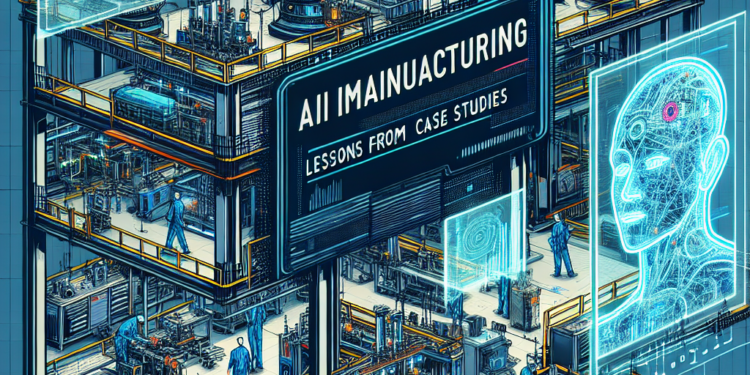Artificial Intelligence (AI) has been making significant strides in the manufacturing industry, revolutionizing the way companies operate and boosting efficiency levels like never before. By applying AI technologies, manufacturers are able to optimize production processes, enhance quality control, improve safety measures, and create innovative products that meet the demands of today’s market.
In this article, we will delve into some noteworthy case studies that demonstrate the impact of AI in manufacturing, highlighting key lessons that other companies can learn from to stay competitive in the rapidly evolving industry.
Case Study 1: Siemens AG
Siemens AG, a global powerhouse in electronics and electrical engineering, has been at the forefront of incorporating AI into its manufacturing operations. One of the key initiatives at Siemens is the use of AI-powered predictive maintenance systems to prevent equipment failures and minimize downtime.
By analyzing data from sensors installed on machines and using AI algorithms, Siemens is able to predict when a machine is likely to fail and schedule maintenance well in advance. This proactive approach has resulted in significant cost savings by reducing unplanned downtime and improving overall equipment efficiency.
Lesson Learned: Implementing predictive maintenance systems powered by AI can help manufacturers reduce costs associated with equipment failures and improve operational efficiency.
Case Study 2: General Electric
General Electric (GE) is another industrial giant that has embraced AI technologies in its manufacturing processes. GE has been using AI to optimize its supply chain management, enabling the company to better forecast demand, optimize inventory levels, and improve logistics planning.
By analyzing large datasets using AI algorithms, GE has been able to identify patterns and trends that were previously unnoticed, resulting in more accurate demand forecasts and optimized inventory levels. This has helped GE reduce excess inventory and improve order fulfillment rates, leading to increased customer satisfaction.
Lesson Learned: Leveraging AI for supply chain optimization can help manufacturers reduce inventory costs, improve logistics planning, and enhance customer satisfaction.
Case Study 3: Ford Motor Company
Ford Motor Company, a leading automobile manufacturer, has been utilizing AI technologies to improve the quality control process in its manufacturing plants. Ford has implemented computer vision systems powered by AI algorithms to detect defects in components and assemblies with greater accuracy and speed.
By analyzing images and videos captured by cameras installed on production lines, Ford’s AI system can identify defects that are often overlooked by human inspectors, leading to higher quality products and reduced scrap rates. This has enabled Ford to improve its manufacturing processes and deliver vehicles that meet the highest quality standards.
Lesson Learned: Integrating AI-powered computer vision systems into the quality control process can help manufacturers enhance product quality, reduce scrap rates, and optimize production processes.
Case Study 4: Foxconn Technology Group
Foxconn Technology Group, a major electronics manufacturer, has been utilizing AI technologies to automate and optimize its manufacturing operations. Foxconn has deployed robotic systems powered by AI algorithms to perform complex assembly tasks with speed and precision.
By leveraging AI-powered robotics, Foxconn has been able to increase production efficiency, reduce labor costs, and enhance product quality. The use of AI technologies has transformed Foxconn’s manufacturing processes, enabling the company to meet the demands of its customers in a rapidly changing market.
Lesson Learned: Implementing AI-powered robotics can help manufacturers increase production efficiency, reduce labor costs, and improve product quality.
In conclusion, the case studies discussed above highlight the transformative impact of AI in manufacturing and the lessons that companies can learn from these successful implementations. By embracing AI technologies, manufacturers can optimize production processes, enhance quality control, improve safety measures, and create innovative products that meet the demands of today’s market. With AI continuing to evolve and mature, it is imperative for companies to stay ahead of the curve and leverage AI to drive growth and competitiveness in the manufacturing industry.













